- Home
- Collins, Max Allan
Hush Money Page 9
Hush Money Read online
Page 9
“Whatever you say, Frank,” Cummins said and returned to his waffles and ham.
“Now,” Frank said. “What do you have to tell me?”
“Just what I said on the phone last night. Empty shell casing in the high weeds, the rough. Four-sixty Mag.”
“That’s old. Nothing new? Anybody see the guy?”
“No. Nobody at the country club saw a thing. ’Course there wasn’t anybody else on the golf course, being so late in the season and all. Back of the rough is a blacktop road with a farmhouse across the way, but the damn farmhouse is set back from the road maybe two hundred yards and nobody there saw a thing, didn’t even notice if a car was parked out front or anything, which it probably wasn’t. He probably parked it up around the turn, where there’s no houses around.”
“How do you read it?”
“Except for the size of the gun, which is weird, I’m telling you, I’d say it was a pro did it. I mean it was very smooth, very professional. No hitches at all. Only I can’t see why some hit man would use a big-game rifle. That’s—I don’t know—silly, or strange, or some damn thing.”
“Somebody’s trying to scare us,” Frank said, meaning the DiPreta family itself. “Somebody’s trying to scare shit out of us.”
“Who’s got a reason?”
“I don’t know. Nobody. Lots of people. Vince has been bitching with Chicago over some things. Talking about cutting some of our ties with ’em, which is part of his wanting to go even more legit than we are already.”
“Would that be smart?”
“Going legit? Well, we could cut some of the dead weight off our payroll, that’s for sure.”
“Frank, that’s not fair.”
“Take it easy, Cummins, I’m just kidding. Me, I don’t mind taking a few chances, if that’s where the money’s at. My brother Vince, he’s older, more conservative, that’s all. But this, this is just a business thing. I can’t see Chicago shooting anybody over it. That’s just not done any more. At least not on our kind of level. The DiPretas are a family, just like Chicago is a family. Nowhere near the same level, sure, I’ll admit we’re not, but we’re a family just the same, which is something that carries respect; that at least is left over from the old days. When that is gone we’ll know the businessmen and politicians have took over. No, not Chicago, not likely. That four-sixty Mag, though, you know what that sounds like to me? That sounds like revenge.”
“I talked to Vince about the playing-card thing.”
“See? That fits in. Revenge. Some personal thing, somebody trying to scare us sort of thing.”
“Yeah, well, I was talking to Brown, you know, my partner?”
“The nigger?”
“Look, Frank, I happen to like Brown, I don’t see any reason calling him a nigger.”
“He’s a nigger, isn’t he?”
“Yeah, he is, but you don’t have to call him that. Anyway, he was in Vietnam.”
“Who was in Vietnam?”
“You know, Brown, the nig, he was in Vietnam and he was telling me about the playing card deal. I mean, I told him about Vince getting that card in the mail, just like his brother Joey did, and Brown said in Vietnam they used to distribute whole damn packs of the ace of spades. Whole fuckin’ damn decks of nothing but aces of spades, and the Americans, after they wasted a bunch of slants, they’d spread ’em around like confetti on the slant corpses, ’cause these slants, they’re superstitious bastards, and the ace of spades, it stands for death, you know, so the Americans would leave ace of spades all over the ground, on and around the dead bodies, to spook the V.C.”
“So what?”
“So maybe somebody’s doing the same thing to you. Trying to spook you with the ace of spades. Like I said, it stands for death.”
“Yeah, I know it stands for death, you dumb- ass, I know that’s what somebody’s trying to do is spook us with the goddamn ace of spades. I mean, it wouldn’t make much sense sending the deuce of hearts, would it, dumb-ass?”
“No, Frank, you don’t follow me. I mean maybe the guy who shot Joey is out of Vietnam. Maybe that’s where he picked up on shooting, too. Sniping. If he was a soldier, I mean. In Vietnam.”
“Wait a minute,” Frank said. Something was starting to click in the back of his head somewhere. Something was starting to click together. “Wait a minute.”
“What, Frank?”
“Nothing yet. Let me think a second.”
Cummins shrugged and returned to his waffles and ham, which were cold now, though that didn’t seem to cool his enthusiasm any.
A few minutes passed, and suddenly somebody rapped on the window right by their booth. Both Frank and Cummins looked up and saw, through the aqua-blue-tinted glass, a figure in jeans and khaki jacket. The most striking thing about the figure was that he was wearing a woolen ski mask. The ski mask was dark blue with red and white trim around the eye holes and was out of place. The morning was a little bit chilly, yes, but a ski mask certainly wasn’t called for.
Then the man in the ski mask held up his right hand to show Frank and Cummins why he’d rapped on the window for their attention.
In the man’s hand was a grenade.
The pin had been pulled, and only the pressure the man was applying to the lever was delaying the triggering of the hand grenade.
Both Frank and Cummins froze for a moment, not yet fully comprehending what was going on. During that moment they watched as the man in the ski mask jogged backward a couple of steps and brought his arm back and then forward, like a major-league pitcher, and the grenade was hurtling toward the window before either man had realized what was happening.
The aqua-blue window shattered, letting in the white light of the sun and the grenade, which bounced once on the booth’s table top and landed on the floor, where Frank and Cummins already had gone to escape the oncoming missile. The two men were on their knees and the grenade was on the floor between them. They looked at each other like two of the Three Stooges doing a take and then scrambled off in opposite directions.
“Jesus Christ, a grenade!” somebody hollered (not Frank, or Cummins, either, both men having their priorities in order, as usual, namely saving their own asses).
People got up from booths, stools, bumped into each other, doing the panic dance. Some of them, the ones close to the door, even managed to get out of the building.
Frank was praying when the grenade exploded; Cummins was crying. The explosion was loud enough to be terrifying, but only momentarily.
There was smoke, but not much, and when it cleared, the grenade was revealed as a lump of metal sitting on the floor of the coffee shop, looking like an oversize walnut with a cracked shell and just about as dangerous.
“A dud,” Cummins said, getting out a handkerchief and hastily drying his eyes. It wouldn’t do, after all, for the detective on the scene to be in tears.
“Not a dud,” Frank said. “Whoever packed it with powder packed it with just enough to make a big bang and scare shit out of everybody.”
The grenade’s shell casing was cracked, but the explosion hadn’t been enough to break it into the destructive splinters that do the damage.
“Like I said before,” Frank said, “somebody’s trying to scare us. Somebody’s playing goddamn games with us.”
“In Vietnam,” Cummins said, “they called it psychological warfare.”
Frank nodded.
Cummins turned to the confused, relieved, but badly shaken group of people, who were standing around the rectangular coffee shop like passengers in a surrealistic subway car, and began to speak in loud, reassuring, authoritarian tones. Pretty good for a guy who a few seconds ago was bawling, Frank thought.
Frank walked back over to the booth, where the broken window gaped; shards of glass filled the seats and littered the table. He went on to the adjacent booth—whoever’d been sitting there before was making no move to reclaim it—and sat down.
On the table was a playing card.
10
> FRANCINE DIPRETA was sitting on her bed, which was shaped like a valentine and soft as custard. The spread was fluffy, ruffly pink. The room around the bed was pink, also: pink wallpaper, pink colonial-style dresser with mirror; even a pink stuffed animal—a poodle—peeked out behind pink pillows resting against the bed’s pink headboard. When Frank, Rosie, and little Francine had moved into the house some ten years before, the little girl had loved the pink room. But Francine was a big girl now and kept in check her intense dislike for the room in all its nauseating pinkness only because it held for her father too many memories of Francine’s childhood and those happy years when Mother was alive. Besides, next year, the year after maybe, she’d be moving out. She was, after all, nineteen years old and a college freshman. Living in this child’s room was a beautiful young woman, with platinum blonde hair and China blue eyes and a trim, shapely figure. As she looked around, she shook her head and thought of the line from that Carly Simon song—”Daddy, I’m no virgin”—but knew that particular sentiment was one she’d never find nerve to express to her own Daddy.
This morning, she sat on the pink elephant of a bed, wearing a pastel-blue cashmere sweater dress, and no panty hose (her summer tan was holding up nicely, her legs looked nice and dark) and thought about the death of her Uncle Joe and wondered what it meant. She’d heard the whisperings, of course, from grade school on up, of how the DiPreta family was supposed to be part of the Mafia, which seemed so silly to her she’d never really got upset about it. Once, though, when she’d asked her father about it, he’d laughed and said, “Everybody who’s got an Italian name, somebody’s gonna think they’re the Mafia . . . too much stupid TV, honey.”
But every now and then there were indications that maybe her father was into something—well—shady, or something. He did, after all, carry a gun at times, but he had his reasons (“I carry a lot of cash, ’cause of the business, honey. There’s lots of crooked people who would take a man’s money if he let them”) and she’d long ago dismissed that. And then there were the occasional men who would come around, the sort of men her father would stand outside on the porch and talk to, or hustle into the study and shut the door. Big men, with odd faces—faces that seemed somehow different from a normal person’s face, colder or harder or something; she didn’t know what. And when she would confront her father with these men, accidentally bump into him while he was talking with one of them, or burst into his study while he was conferring with one or more of them, he would never introduce her. Oh, sometimes he would say to the men in an explaining way, “This is my daughter.” But never would he say, “Mr. So-and-so, this is my daughter, Francine. Francine, this is Mr. So-and-so.”
And now Uncle Joe getting shot. Why would anybody want to shoot Uncle Joe? Everybody in the family regarded Joe as the baby. Even Francine, his niece, less than half Joe’s age, thought of him as the spoiled kid of the clan, the genial loafer, the golf bum, a practical joker, a kidder—but somebody who somebody else would want to shoot? That was crazy.
But then so were the rumors about DiPreta Mafia connections. So crazy Francine didn’t take them seriously, even found them laughable. Look at Uncle Vince, for example. Chairman of half the charities in town, one of the all-time biggest contributors to the Church, besides. Uncle Vince was one of the most socially concerned citizens in all Des Moines. And her father, Frank, who like all the DiPretas belonged to the swankiest country club in town, counted among his close friends men in city, state, and national government, senators, judges, the highest men in the highest and most respected places. Were these the friends of a “gangster”?
Her father was a gentle man, a kind man, although he did keep his emotions in and might seem cold to, say, some of the people he did business with. Even Francine had considered her father somewhat remote, aloof, until she finally got a glimpse of the sensitive inner man when her mother died six years ago. Her mother had been killed by a drunken driver one rainy, slippery night, just two miles from home. (The road in front of their house in the country was then narrow and treacherous, and only recently—partly through her father’s pulling of political strings—had that road been widened and improved and watched over diligently by highway patrol officers.) Francine, crushed, stunned and (perhaps most important) confused over her mother’s death, had wondered why her father didn’t show his grief more openly, why he seemed almost callous about the loss of his wife; and, as a child will do—and she’d been a child then, just having entered junior high and loving that pink room of hers—she had asked him straight out, “Why, Daddy? Why don’t you cry for Mommy?” And the tears had flowed. The dam had burst, and for several minutes Frank DiPreta had sobbed into his daughter’s arms. She had cried, too, and had felt very close to her father then for perhaps the first time. There had been no words spoken, just an almost momentary show of mutual grief; but it was the beginning of her father’s transference of worship for his wife to his daughter, and thereafter anything she’d asked of him, he’d given. She had tried not to take advantage, but it hadn’t been easy.
He was a remarkable man, though. What with all the silly Mafia rumors and all, you might think of him as the kind of man who would harbor thoughts of violence and revenge where his wife’s killer was concerned. But Francine had never heard her father say even one word about that man who’d run his car over the center line, in a drunken stupor, forcing Rose DiPreta off the road and killing her. Francine remembered saying, “I could kill that man, Daddy. I could just take him and kill him.” And her father had said, “You mustn’t say that, honey. It won’t bring Mommy back.” He had seemed content to let the courts handle the man, who’d been arrested at the scene of the accident. Of course poetic justice or fate or whoever had taken care of things, ultimately. Before the man could be brought to trial, he himself was, ironically enough, run down and killed by a hit-and-run driver.
And now, with Uncle Joe’s death, her father was again reacting in a subdued manner, though she could tell—or at least guess—that he was very much moved by the loss of his brother. The DiPreta men were a dying breed anyway, this branch of the family at any rate. Joe had been a bachelor; Frank had only one child, Francine herself; and Vince’s only son had died of leukemia a few years back. Uncle Vince seemed more visibly shaken by his brother’s death than her father, but then ever since Vince’s son had died he’d been walking around under a cloud. That was the bad thing about Uncle Vince, sweet as he was: You could get depressed just thinking about him.
She didn’t like being depressed. When her father had asked her to go down to the funeral home where Aunt Anna and the other relatives were greeting friends and such, she told him she wasn’t up to it; she just couldn’t take all the mourning and tears. And, of course, her father hadn’t insisted she go; he never insisted she do anything, really.
She got up from the bed and grabbed her schoolbooks and sketch pad from off the dresser, having made the decision to get out of the house, to drive into Des Moines to the Drake campus and attend the rest of the day’s classes, death in the family or not. She’d go downstairs and tell Daddy and that would be that. Life goes on; that’s the best way to handle tragedy, right?
Francine found her father with her uncle in the study. They were talking to a tall, gaunt man with shaggy dark hair and a droopy mustache and a sort of Indian look to him around the cheekbones and eyes. Though the man was nicely dressed, in an obviously expensive tailor-made suit, he had that vaguely sinister aura of so many of the men Francine had seen in this house over the years.
“My daughter,” her father explained to his guest and took her by the arm and stepped outside the study with her. “What is it, honey?”
“I’m going on ahead to school, Daddy. I don’t see any reason missing any more classes. Unless you want me to stay and fix you lunch or something.”
“Baby, I don’t care about lunch, but don’t you think you ought to be helping your aunt at the funeral home? People are coming from out of town, friends of the family. Lot of imp
ortant people will be expecting to see you there.”
“Come on, Daddy. It’s a funeral home, not my coming-out party. I won’t be missed. Besides, it’s just too much of a downer, Daddy, please.”
“Downer? What land of word is that?”
“Please, Daddy.”
“You should help out.”
“Maybe tonight.”
“For sure tonight?”
“Maybe for sure.”
She kissed him on the cheek and he pushed her away gently, with a teasing get-outta-here-you look on his face.
The white Mustang she’d gotten for high-school graduation was parked in the graveled area next to the house. The house was a red brick two-story with a large red tile sloping roof, brick chimney, and cute little windows whose woodwork was painted white, as was an awning arched over the front door. The house sat on a huge lawn, a lake of grass turning brown now, though the shrubs hugging the house, and the occasional trees all around the big yard, were evergreen. It was the dream cottage every couple would like to while the years away in, right down to the picket fence, but on a larger scale than most would dare dream. Immediately after Mother’s death, her father had put the house up for sale; soon after, though, he’d relented, and had since treated the house like a museum, keeping everything just the same as when Mother was alive—Daddy’s-little-girl pink bedroom included.
At first she didn’t notice the other car parked on the gravel on the other side of her Mustang. But it was hard to miss for long, a bright gold Cadillac that was finding light to reflect even on an overcast day like this one. A young guy was standing beside the car, leaning against it. He was cute. Curly hair, pug nose, nice eyes and altogether pleasant, boyish face. He was probably around twenty or twenty-one, kind of small, not a whole lot taller than she, and looking very uncomfortable in light blue shirt and dark blue pullover sweater and denim slacks. Looking as though he wasn’t used to wearing anything but T-shirts and worn out jeans and no shoes.

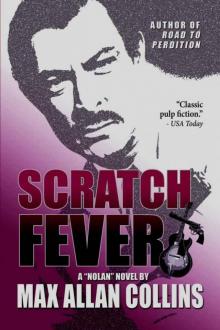 Scratch Fever
Scratch Fever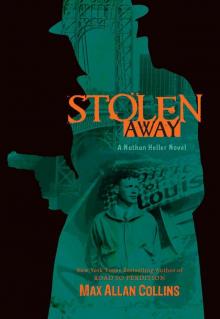 Stolen Away
Stolen Away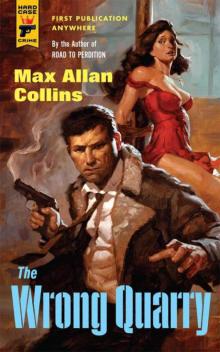 The Wrong Quarry (Hard Case Crime)
The Wrong Quarry (Hard Case Crime) Quarry
Quarry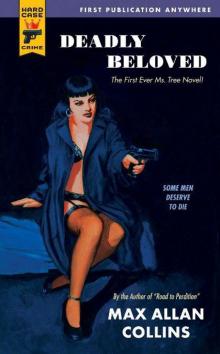 Hard Case Crime: Deadly Beloved
Hard Case Crime: Deadly Beloved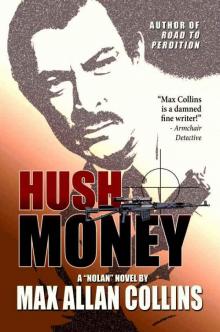 Hush Money
Hush Money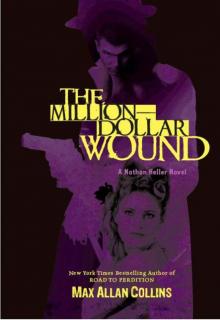 The Million-Dollar Wound
The Million-Dollar Wound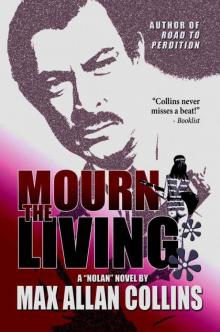 Mourn The Living
Mourn The Living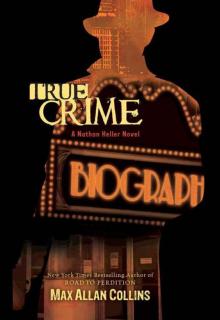 True Crime
True Crime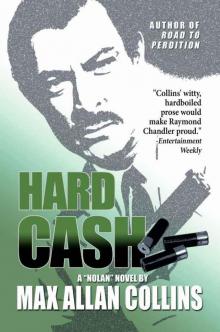 Hard Cash
Hard Cash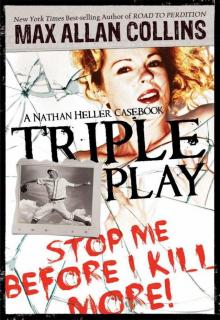 Triple Play: A Nathan Heller Casebook
Triple Play: A Nathan Heller Casebook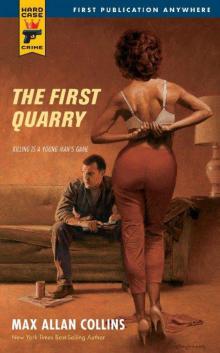 Hard Case Crime: The First Quarry
Hard Case Crime: The First Quarry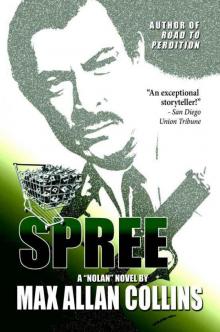 Spree
Spree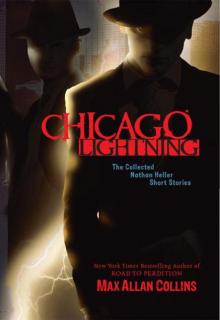 Chicago Lightning : The Collected Nathan Heller Short Stories
Chicago Lightning : The Collected Nathan Heller Short Stories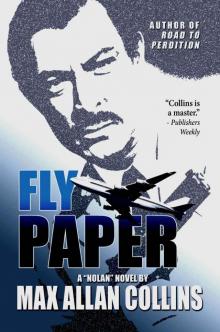 Fly Paper
Fly Paper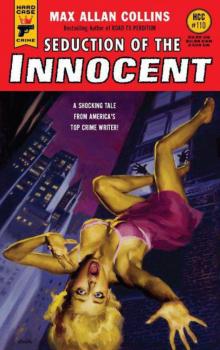 Seduction of the Innocent (Hard Case Crime)
Seduction of the Innocent (Hard Case Crime)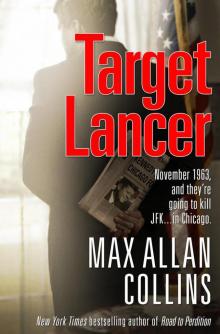 Target Lancer
Target Lancer